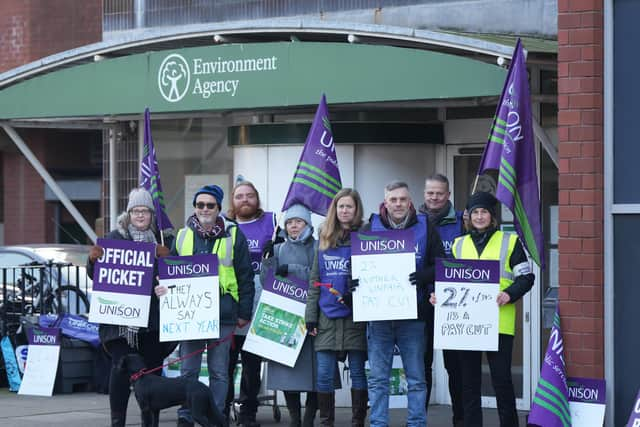Environment Agency staff on strike in Worthing over pay dispute
and live on Freeview channel 276
Staff who belong to Unison and Prospect and work in river inspection, flood forecasting, coastal risk management and pollution control are staging a 12-hour strike, which began at 7am.
In addition, for 12 hours either side of the walkout, Environment Agency employees will escalate their ongoing work to rule by withdrawing from incident response rotas, the unions said.
Advertisement
Hide AdAdvertisement
Hide AdThis action short of a strike starts at 7pm on Tuesday, and kicks in again immediately at the end of the strike for another 12 hours, concluding at 7am on Thursday.


“During these hours, there’ll be fewer experienced Environment Agency staff to provide cover if an incident occurs,” a spokesperson for both unions said.
"However, where there’s a genuine threat to life or property from something like a major flood, officers will step in as emergency ‘life and limb cover’ has been agreed with agency managers.”
The unions described the Environment Agency as the ‘fourth emergency service’.
Advertisement
Hide AdAdvertisement
Hide AdStriking staff are based on picket lines in Worthing (Guildbourne House, Chatsworth Road), Romsey and Canterbury from 8am today (Wednesday).
Prospect general secretary Mike Clancy said ‘low pay, under-resourcing and under-staffing’ mean it’s ‘almost impossible’ for Environment Agency staff to ‘properly inspect, regulate and protect the natural environment’.
He added: “This has resulted in problems including sewage discharge and pollution of waterways, which will only get worse unless action is taken.
“Staff love their jobs, but simply cannot continue to do them when their pay is decreasing in real terms every single year. The only option left is industrial action.
Advertisement
Hide AdAdvertisement
Hide Ad“To protect the environment, regulators must be properly resourced. That means fair pay and recruiting and retaining a skilled, experienced workforce. If that doesn’t happen, the regulator can’t do its job, and everybody suffers.”
This latest industrial action comes after Environment Agency staff, belonging to Unison, went on strike on January 18.
UNISON head of environment Donna Rowe-Merriman said: “Communities across England are kept safe because of the tireless efforts of Environment Agency workers.
“Staff shortages and persistent underfunding have left the Agency in a difficult place, without the employees to meet the growing challenges posed by climate change.
Advertisement
Hide AdAdvertisement
Hide Ad“Not a single Environment Agency worker wants to take action but the government’s failure to find a solution has left them with no other option but to walk out again next month.
“It’s in everyone’s best interests that a solution is found quickly. The government must act now to get talks in motion that could prevent further escalation.”
Employees in both unions have been working to their contracts and ‘refusing to volunteer for overtime’ for ‘several weeks’. For short periods around the festive season, they withdrew from incident rosters.
The unions are critical of the government for ‘not doing anything’ to end the dispute. Both want ministers to grant senior managers at the Environment Agency permission to start proper pay negotiations.
Advertisement
Hide AdAdvertisement
Hide AdA spokesperson for the unions added: “The government’s failure to fund the Agency properly over many years is why wages are too low and nowhere near the going rate for the skilled jobs these workers do.